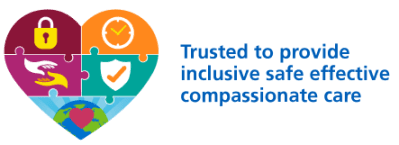Some women and birthing people, due to a variety of factors, will make a decision alongside their obstetric and midwifery team to have a planned caesarean birth (sometimes called an elective caesarean). Our team will discuss your individual circumstances with you and let you know what care options you have and what they recommend, so that you can make an informed decision.
Before your operation you will need to have some blood tests and swabs. An appointment will be given to you to attend our Antenatal Assessment Unit (AAU) or MAS to have these done. These tests will check your haemoglobin levels, blood group and your methicillin-resistant Staphylococcus aureus (MRSA) status.
The day before your caesarean you will be asked to take some medication. These are taken the night before and also on the morning of your operation, as directed. You should not eat any food for at least six hours prior to your operation but may drink water until 06:00 on the morning of your operation.
On the day of your caesarean you will normally arrive at our Swan Ward around 07:30. We perform planned caesarean births on weekdays, usually between 08:30 and 13:00, however sometimes we do run additional afternoon lists. If you have been allocated to an afternoon list, these timings will be different. Please refer to your appointment letter for admission instructions. You will be seen by the midwifery, obstetric and anaesthetic teams before your operation and at this point will be informed when your caesarean is likely to take place. During this time you can discuss any questions you might have or let us know if you have any music or preferences for your birth experience. You will be asked to put on a theatre gown and some stockings prior to going into theatre. Occasionally if the Labour Ward is busy you may have to wait for a period of time before your operation can start. If there are any expected delays to your operation, our team will keep you updated as much as possible. If your reason for a caesarean birth is because your baby is breech you will have an ultrasound on the day. If it is found that your baby has moved into the head down position the obstetrician will have a discussion with you about your birth options. You may be offered induction of labour or be able to wait until you go into labour naturally instead of having a caesarean.
In the obstetric theatre, your chosen birth partner can normally accompany you and can stay by your side throughout your surgery, unless, for medical reasons, you require a general anaesthetic. Your birth partner will need to wear theatre scrubs, shoe covers and a theatre hat. These will be supplied to you when you move to the theatres.
When you arrive in theatre, the anaesthetist will insert a cannula into your hand or arm before the operation starts to allow us to give you the medications you need throughout your surgery. The majority of women and birthing people have a spinal anaesthetic which causes the body to go numb from the abdomen to the feet. The anaesthetist will support you throughout your anaesthetic procedure. Once the anaesthetic is effective, a catheter is inserted into your bladder. This protects the bladder throughout your caesarean. This is usually removed between 12 and 24 hours following your operation. Your midwife will be able to advise you how long it needs to stay in for – everyone’s care is individual. Once the operation starts the baby is usually born within about 10 minutes, and all being well you can have skin-to-skin contact with them in the operation theatre whilst the operation is completed.
After the surgery you will be moved into our theatre recovery area where you will be observed closely for around 30 minutes. During this time the midwife will support you to feed your baby and complete any checks that they may need. Following this observation period, you will be moved back to our Swan Ward.
Following a planned caesarean birth, most women and birthing people stay for at least one night, depending on their recovery and the care their baby needs. You will be given regular painkillers and help to mobilise once the anaesthetic wears off. Most women and birthing people are able to get out of bed, with the help of staff, within 6 to 8 hours of birth.
Pregnancy and birth can be unpredictable and sometimes your journey to parenthood might be different to what you expected. Throughout your pregnancy and labour you will be supported and monitored by one of our midwives and, if needed, one of our obstetricians during your time with us. The midwife or obstetrician complete assessments throughout your pregnancy and labour and if there are any concerns about your health or your baby’s health this will be discussed with you and a plan of care made with you.
In some scenarios you may be offered an emergency caesarean section. Although we use the word “emergency” this refers to all caesareans completed outside of our planned theatre list. The midwifery and obstetric team will let you know the timescale in which your caesarean needs to take place. It might be that your baby will be born within an hour of the decision or assessment, or your caesarean may be booked for the following day. Our team will discuss your individual circumstances with you and let you know what care options you have and what they recommend, so that you can make an informed decision about the care you receive.
Once you are in theatre the procedure is the same as for a planned caesarean section. Most of our caesarean sections are completed using a spinal anaesthetic (epidural) which means you will be awake for the birth of your baby – please see the section marked “Having a planned caesarean” for full details. If you have a good working epidural this will be used/topped up to offer the anaesthetic you require for the procedure. Rarely, it may not be possible to have an epidural which means you would have a general anaesthetic. The anaesthetist will explain what anaesthetic procedure is best and safest for you and your baby.
If required, the paediatric team may attend theatre and be present for the birth of your baby. Even though most of the time we do not need their expert help or assistance it is important to have them there “just in case”. If your baby is unwell then the paediatric and midwifery team will give them the help and support they need in theatre. You will be able to see your baby at all times. The midwife will keep you up to date on your baby’s health and let you know if any further treatment or observation is required.
Following an emergency caesarean birth most women and birthing people stay for at least one night, depending on their recovery and the care their baby needs. You will be given regular painkillers and help to mobilise once the anaesthetic wears off. Most women and birthing people are able to get out of bed, with the help of staff, within 6-8 hours of birth.
You may also like to read our leaflet on having a caesarean birth at Warwick Hospital.

